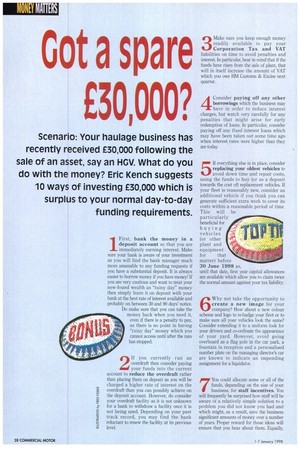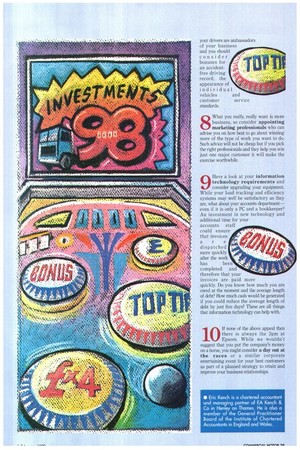Got a spare
Page 30

Page 31

If you've noticed an error in this article please click here to report it so we can fix it.
E30,000.
Scenario: Your haulage business has recently received £30,000 following the sale of an asset, say an HGV. What do you do with the money? Eric Kench suggests 10 ways of investing £30,000 which is surplus to your normal day-to-day funding requirements.
1 First, bank the money in a deposit account so that you are immediately earning interest. Make sure your bank is aware of your investment as you will find the bank manager much more amenable to any funding requests if you have a substantial deposit. It is always easier to borrow money if you have money! If you are very cautious and want to treat your new-found wealth as "rainy day" money then simply leave it on deposit with your bank at the best rate of interest available and probably on between 30 and 90 days' notice.
Do make sure that you can take the money back when you need it, even if there is a penalty to pay, as there is no point in having "rainy day" money which you cannot access until after the rain has stopped.
2 If you currently run an overdraft then consider paying your funds into the current account to reduce the overdraft rather than placing them on deposit as you will be charged a higher rate of interest on the overdraft than you can possibly achieve on the deposit account. However, do consider your overdraft facility as it is not unknown for a bank to withdraw a facility once it is not being used. Depending on your past track record, you may find the bank reluctant to renew the facility at its previous level. 3 Make sure you keep enough money readily available to pay your Corporation Tax and VAT liabilities on time to avoid penalties and interest. In particular, bear in mind that if the funds have risen from the sale of plant, that will in itself increase the amount of VAT which you owe HM Customs & Excise next quarter.
4 Consider paying off any other borrowings which the business may have in order to reduce interest charges, but watch very carefully for any penalties that might arise for early redemption of loans. In particular, consider paying off any fixed interest loans which may have been taken out some time ago when interest rates were higher than they are today 5 If everything else is in place, consider replacing your oldest vehicles to avoid down time and repair costs, using the funds to buy (or as a deposit towards the cost of) replacement vehicles. If your fleet is reasonably new, consider an additional vehicle if you think you can generate sufficient extra work to cover its costs within a reasonable period of time. This will be
particularly beneficial for buying vehicles (or other plant and equipment
for that matter) before 30 June 1998 as,
until that date, first year capital allowances are available which allow you to claim twice the normal amount against your tax liability.
6 Why not take the opportunity to create a new image for your company? How about a new colour scheme and logo to re-badge your fleet or to make sure all your vehicles look the same? Consider extending it to a uniform look for your drivers and co-ordinate the appearance of your yard. However, avoid going overboard as a flag pole in the car park, a fountain in reception and a personalised number plate on the managing director's car are known to indicate an impending assignment for a liquidator.
7 You could allocate some or all of the funds, depending on the size of your business, for staff incentives. You will frequently be surprised how staff will be aware of a relatively simple solution to a problem you did not know you had and which might, as a result, save the business significant amounts of money over a number of years. Proper reward for those ideas will ensure that you hear about them. Equally,
your drivers are ambassadors of your business and you should consider bonuses for an accidentfree driving record, the appearance of individual vehicles and customer service standards.
8 What you really, really want i's more business, so consider appointing marketing professionals who can advise you on how best to go about winning more of the type of work you want to do. Such advice will not be cheap but if you pick the right professionals and they help you win just one major customer it will make the exercise worthwhile.
9 Have a look at your information technology requirements and consider upgrading your equipment. While your load tracking and efficiency systems may well be satisfactory as they are, what about your accounts department— even if it is only a PC and a bookkeeper? An investment in new technology and additional time for your
accounts staff could ensure that invoices a r e dispatched more quickly after the work has been completed and therefore that your invoices are paid more quickly. Do you know how much you are owed at the moment and the average length of debt? How much cash would be generated if you could reduce the average length of debt by just five days? These are all things that information technology can help with.
If none of the above appeal then there is always the 3pm at
Epsom. While we wouldn't suggest that you put the company's money on a horse, you might consider a day out at the races or a similar corporate entertaining event for your best customers as part of a planned strategy to retain and improve your business relationships.
• Eric Kench is a chartered accountant and managing partner of EA Kench & Co in Henley on Thames. He is also a member of the General Practitioner Board of the Institute of Chartered Accountants in England and Wales.
















































































